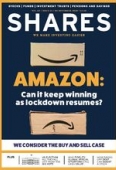Archived article
Please note that tax, investment, pension and ISA rules can change and the information and any views contained in this article may now be inaccurate.
How ‘Lockdown 2’ news impacted the markets

London’s blue chip benchmark index seemingly took the imposition of a new England-wide lockdown in its stride, the FTSE 100 finishing 2 November with a 1.4% gain to 5,654 points, helped by a weaker pound.
However, the more domestically focused FTSE 250 fell by 0.2% as investors fretted over the impact of Boris Johnson’s latest lockdown on the non-essential retailers, pub companies and leisure groups that are dependent on consumer footfall and spending.
The FTSE’s positive moves on in the immediate aftermath of the lockdown news may seem surprising, given that ING economist James Smith forecasts the restrictions will knock roughly 6%-to-7% off of November’s GDP. Yet investors should remember that roughly three quarters of the FTSE 100 generates its earnings overseas, so the news is less of a blow to the blue chip benchmark index than one might think.
In addition, ‘Lockdown 2’ is only supposed to last for a month, whereas the first one was introduced on an open-ended basis back in March, and isn’t going to be as restrictive as the UK’s original pandemic-induced economic deep-freeze.
Another factor at play was that the FTSE 100 was at a six-month low ahead of the announcement. The week running up to the lockdown announcement saw five straight days of losses and October marked it the worst monthly performance fore the index since March.
Hopes for a speedy recovery from the pandemic had already been eroded with bad news priced in.
LOCKDOWN LOSERS
Unsurprisingly, news of the imposition of a fresh lockdown during the run-up to Christmas, and due to last from 5 November to 2 December, sent shares in footfall-dependent retail, travel and leisure stocks lower.
As our table (overleaf) shows, with pubs and gyms having to close during lockdown 2, the likes of pub group Young’s (YNGA:AIM) and The Gym Group (GYM) were friendless, while PPHE Hotels (PPH) fell 7.2% on worries hotel demand will plummet once again. Embattled Ted Baker (TED) tumbled 11% on fears the new lockdown will derail the brand’s recovery efforts, while office services outfit Restore (RST:AIM) was 8.6% down over the two and a half days amid concerns that the latest shutdown could delay office removal work.
YOU WIN AGAIN
Conversely, winners from the first lockdown caught a bid once again, among them online retailers such as web-based white goods seller AO World (AO.) and musical instruments purveyor Gear4music (G4M:AIM). Ocado (OCDO) was also in demand after delivering another earnings guidance upgrade and as investors bet its technology for online grocery systems would be in greater demand.
Elsewhere in retail, B&Q-owner Kingfisher (KGF) was in demand as investors factored in another splurge in DIY-related spending, as was general merchandise discounter B&M European Value Retail (BME), as investors bet its winning value proposition will continue to resonate with cash-strapped shoppers during the difficult weeks ahead.
McColl’s (MCLS) was marked up on the basis that its neighbourhood stores will see increased demand during the second lockdown, while over in the mining sector, Fresnillo (FRES) firmed 8.2% on the basis that investors turn to gold during turbulent times.
FOOD, GLORIOUS FOOD
Companies playing an essential role in keeping the nation fed also caught a bid, with supermarkets Tesco (TSCO), Sainsbury’s (SBRY) and Morrisons (MRW) rising as investors priced in bumper demand for groceries over the near term.
And with the emphasis back on eating at home, investors also showed a strong appetite for shares in lockdown 1 winners Premier Foods (PFD) and pork-to-poultry producer Cranswick (CWK).
Oil slips lower
The imposition of renewed lockdowns in England and other countries put pressure on the oil price with the Brent benchmark still trading below $40 per barrel at the time of writing. The market apparently pricing in the impact on demand of new restrictions on travel and wider economic activity. This, combined with an increase in output from Libya, means the stakes keep being raised ahead of OPEC’s meeting to determine the fate of current production quotas on 30 November.
Important information:
These articles are provided by Shares magazine which is published by AJ Bell Media, a part of AJ Bell. Shares is not written by AJ Bell.
Shares is provided for your general information and use and is not a personal recommendation to invest. It is not intended to be relied upon by you in making or not making any investment decisions. The investments referred to in these articles will not be suitable for all investors. If in doubt please seek appropriate independent financial advice.
Investors acting on the information in these articles do so at their own risk and AJ Bell Media and its staff do not accept liability for losses suffered by investors as a result of their investment decisions.
 magazine
magazine










